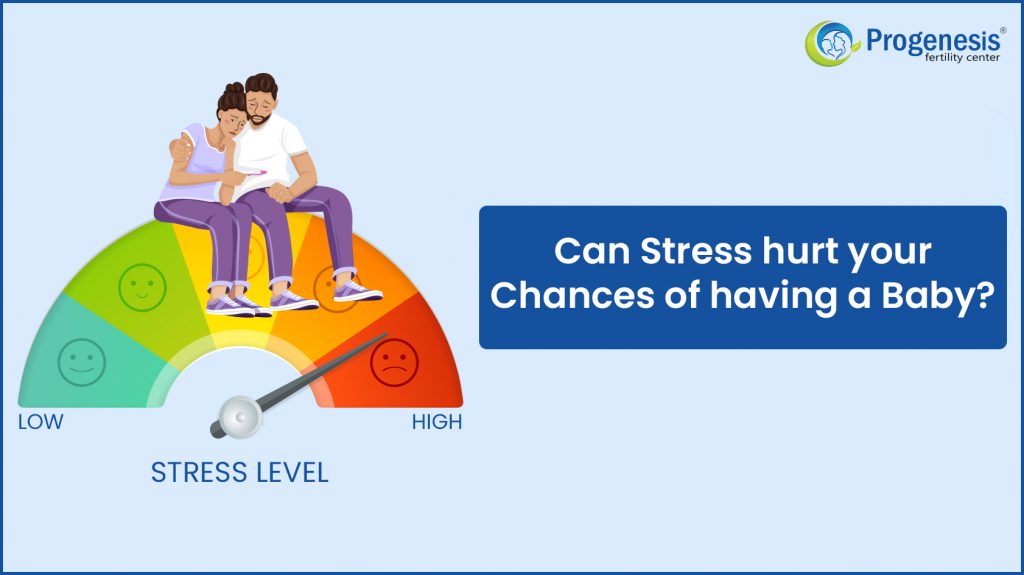In the daily routine of a person, one comes across a lot of stressful events. Whether it is a family matter or pressure at work, stress can make our day tiring, it may have long-term effects on our health and fertility too. In this blog, we will discuss the relation of stress with fertility.

Is stress a factor in infertility?
Stress affects a woman’s ability to conceive. Your body is wise; it understands that stressful periods are not ideal for having a child. According to studies, women who have a history of depression are twice as likely to have infertility. Anxiety might also lengthen the time it takes to conceive. Research says, women experiencing infertility experience the same levels of anxiety and depression as those diagnosed with cancer or HIV and the longer you struggle to become pregnant, the more stressed you get.
Reasons why stress causes fertility issues
- Stressed women are likely to have fewer sexual encounters
- They are more inclined to smoke or consume excessive amounts of alcohol or coffee.
- Cortisol and other stress hormones affect signaling between the brain and the ovaries, which can interfere with ovulation.
- Your hormone levels and menstruation cycles may also get affected by stress
- Stress can cause people to engage in unhealthy habits including sleeping too much or too little, maintaining a poor diet, skipping their regular exercise, or exercising excessively.
Having stress for not being able to conceive?
Get a free consultation appointment with our fertility experts today.
Free consultationHow to manage stress?
- Therapy: Therapy might help you reinterpret your feelings. You learn to confront automatic negative ideas such as “I’ll never get pregnant,” or to blame yourself.
- Yoga: Because many people with fertility issues feel upset with their bodies, they stop taking care of it. Yoga allows them to reconnect with themselves.
- Exercise: Physical activity reduces stress and increases fertility, when done in the right amount.
- Monitor your weight: Stress has the unfortunate tendency to make people turn to food for emotional support. Obesity makes it more challenging to become or maintain a pregnancy.
- Maintain a healthy diet: It’s tempting to eat a lot of processed, sugar-laden foods while you’re stressed. But compared to women who consume a high-fat, heavily processed diet, those who consume a diet heavy in whole grains, omega-3 fatty acids, seafood, and soy are more likely to become pregnant.
- Talk to your partner: Lastly, it is critical for the women and their partners to communicate and listen to one another about their common challenges. This, in addition to joining support groups, can help relieve the mental and emotional toll of infertility.
Symptoms of infertility
In addition to having difficulty conceiving, symptoms might differ greatly from person to person. Women may occasionally experience pelvic pain, painful periods, missed periods, or erratic vaginal bleeding depending on the cause of infertility. If you are going through a lot of stress and are unable to conceive, visit a fertility specialist as your stress might be causing your hormonal issues or issues with ovulation, preventing you from successfully conceiving a child.
Infertility can be caused by a variety of reasons. The sooner you start your treatment, the better are the results.
Free consultationHow can a fertility clinic help?
Visiting a fertility clinic and getting a thorough diagnosis done by a fertility specialist will help you identify your cause of infertility better. Apart from stress, there might be other factors leading to infertility. A fertility clinic can be helpful in the following ways:
- It ensures a higher chance of having a successful pregnancy.
- It aids in the treatment of male and female infertility.
- You can choose the most suitable period to start trying.
- It lowers the risk of miscarriage
- It increases the likelihood of having a healthy baby.
The more attention the clinic pays to diagnosis, tests, medication, retrieval, fertilization, monitoring, counseling, and support, the greater are your chances of getting pregnant.
Real life incidents that causes issues with pregnancy
Mr. and Mrs. Gaike, a couple who seeked treatment at fertility center, suffered from miscarriages. Even after successful IVF, the couple was not being able to maintain the pregnancy and the reason was diagnosed to be stress.
Another couple came to Progenesis with a complain that even after trying for a year they were unable to conceive. After diagnosis it was discovered that they were fertile but due to some issues in their marriage, they were suffering from stress and were not being able to conceive. They were recommended therapy.
FAQs:
Is it possible to get pregnant if you are stressed?
The stress hormone cortisol can have an effect on the body’s systems, which can then have an effect on reproductive processes like your menstrual cycle. But women who experience little stress on a daily basis can become pregnant.
Can stress affect egg quality?
Oocyte quality declines as a result of increased levels of stress hormones like cortisol, which may have an impact on the granulosa cell functions within the follicle and diminish estradiol output.
Does stress change ovulation?
If your stress level is high but somewhat constant, your body will probably adjust to it and you’ll probably still ovulate every cycle. Your cycle might be thrown off and ovulation interfered with by sudden stress. Of course, this differs from women to woman.
Can stress cause infertility in male?
Erectile dysfunction, low sperm concentration and motility, and stress are the most common causes of infertility in men.
Does stress cause infertility in female?
According to research, women who have a history of depression are twice as likely to struggle with infertility. Additionally, anxiety might extend the conception period.
Reference: https://www.webmd.com/baby/features/infertility-stress
